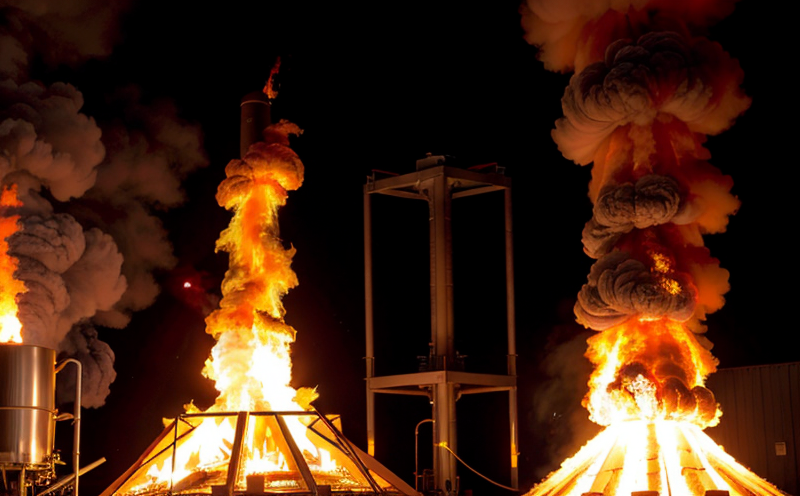Polymer Flammability Testing
Understanding polymer flammability is crucial in various sectors including aerospace, automotive, electronics, and consumer goods. Flame propagation can lead to significant safety hazards, making it imperative that polymers used in these applications meet stringent fire safety standards. This service ensures the compliance of your materials with international standards such as ISO 13525, ASTM E606, and EN 458.
In this testing procedure, we evaluate how a polymer behaves when exposed to an ignition source. The parameters measured include flaming and non-flaming combustion rates, heat release rate (HRR), smoke density, and other relevant characteristics. Proper characterization of these properties helps in selecting the most suitable materials for your product design.
The first step involves preparing the specimen according to ASTM E606 or EN 458 guidelines. This includes ensuring uniform thickness, appropriate dimensions, and surface finish. Once prepared, the specimen is subjected to a controlled environment where it is ignited under specific conditions that simulate real-world scenarios such as those encountered in aircraft cabins or electronic devices.
The testing apparatus used for this service typically consists of a cone calorimeter which measures heat release rate, oxygen index tester for measuring the minimum oxygen concentration necessary to support combustion and smoke density. Additional instruments may also be employed depending on the specific requirements of your project.
Upon completion of the test runs, detailed reports are generated summarizing all measured parameters along with comparisons against specified limits defined by relevant standards. These reports serve as valuable tools for quality control departments responsible for ensuring product safety and compliance.
By offering this comprehensive polymer flammability testing service, we aim to provide you with reliable data that can inform decisions about material selection and design optimization aimed at enhancing fire safety performance across various industries.
Scope and Methodology
The scope of our polymer flammability testing service encompasses a range of services tailored specifically towards assessing the flammability properties of polymers. Our methodology adheres strictly to international standards ensuring accuracy, consistency, and reliability in every test run.
To begin with, we use state-of-the-art equipment calibrated periodically against recognized reference materials provided by organizations like NIST or BIPM. This ensures precision throughout all stages of testing. Specimens are prepared meticulously following specified dimensions and tolerances outlined in relevant standards such as ASTM E606 or EN 458.
The actual test procedure involves placing the specimen into a controlled environment where it is exposed to an ignition source for a brief period. Heat release rate (HRR), smoke density, and other key parameters are continuously monitored using sophisticated instrumentation. Afterward, detailed reports summarizing all findings along with any deviations from set limits are provided.
Our team of experienced professionals ensures that each test adheres strictly to best practices recommended by leading bodies in the field such as ASTM International or European Committee for Standardization (CEN). Compliance with these guidelines guarantees high-quality results which can be trusted when making critical decisions regarding material selection and product design.
Industry Applications
Polymer flammability testing plays an essential role in ensuring the safety of products across numerous industries. Aerospace manufacturers rely heavily on this service to comply with stringent regulations governing materials used within aircraft interiors where fire resistance is paramount. Automotive companies also benefit greatly from our expertise as they strive to incorporate safer components into their vehicles.
Consumer electronics firms likewise depend on polymer flammability testing services to protect end users from potential risks associated with electrical fires. By adhering closely to established standards, these organizations can rest assured that the materials incorporated into their products meet stringent safety criteria.
In addition to these sectors, medical device manufacturers must ensure that all components used in patient care environments comply with appropriate flammability specifications. This helps prevent accidents that could compromise patient safety or lead to costly recalls.
Finally, furniture designers and manufacturers need accurate data regarding the flammability characteristics of fabrics and foams utilized in their products. Our testing ensures that these items meet necessary standards thereby protecting consumers from accidental fires while enhancing overall comfort levels.
Quality and Reliability Assurance
At [Lab Name], we pride ourselves on delivering high-quality, reliable results through rigorous quality control measures at every stage of the testing process. From specimen preparation to final report generation, our team adheres strictly to international standards ensuring accuracy, consistency, and repeatability.
We employ advanced calibration techniques using reference materials provided by recognized organizations such as NIST or BIPM. This guarantees that all instruments used in testing are accurate and reliable right from the start. Specimens prepared follow precise dimensions and tolerances specified in relevant standards like ASTM E606 or EN 458 ensuring uniformity across multiple samples.
The actual test procedure involves placing the specimen into a controlled environment where it is exposed to an ignition source for a brief period. Continuous monitoring of heat release rate (HRR), smoke density, and other key parameters using sophisticated instrumentation ensures real-time data collection during each run. Post-test analysis includes thorough examination of all gathered information alongside comparison against specified limits defined by relevant standards.
Our dedicated staff members possess extensive experience in polymer flammability testing adhering closely to best practices recommended by leading bodies such as ASTM International or European Committee for Standardization (CEN). Compliance with these guidelines ensures that every test conducted meets the highest quality and reliability standards available today.





